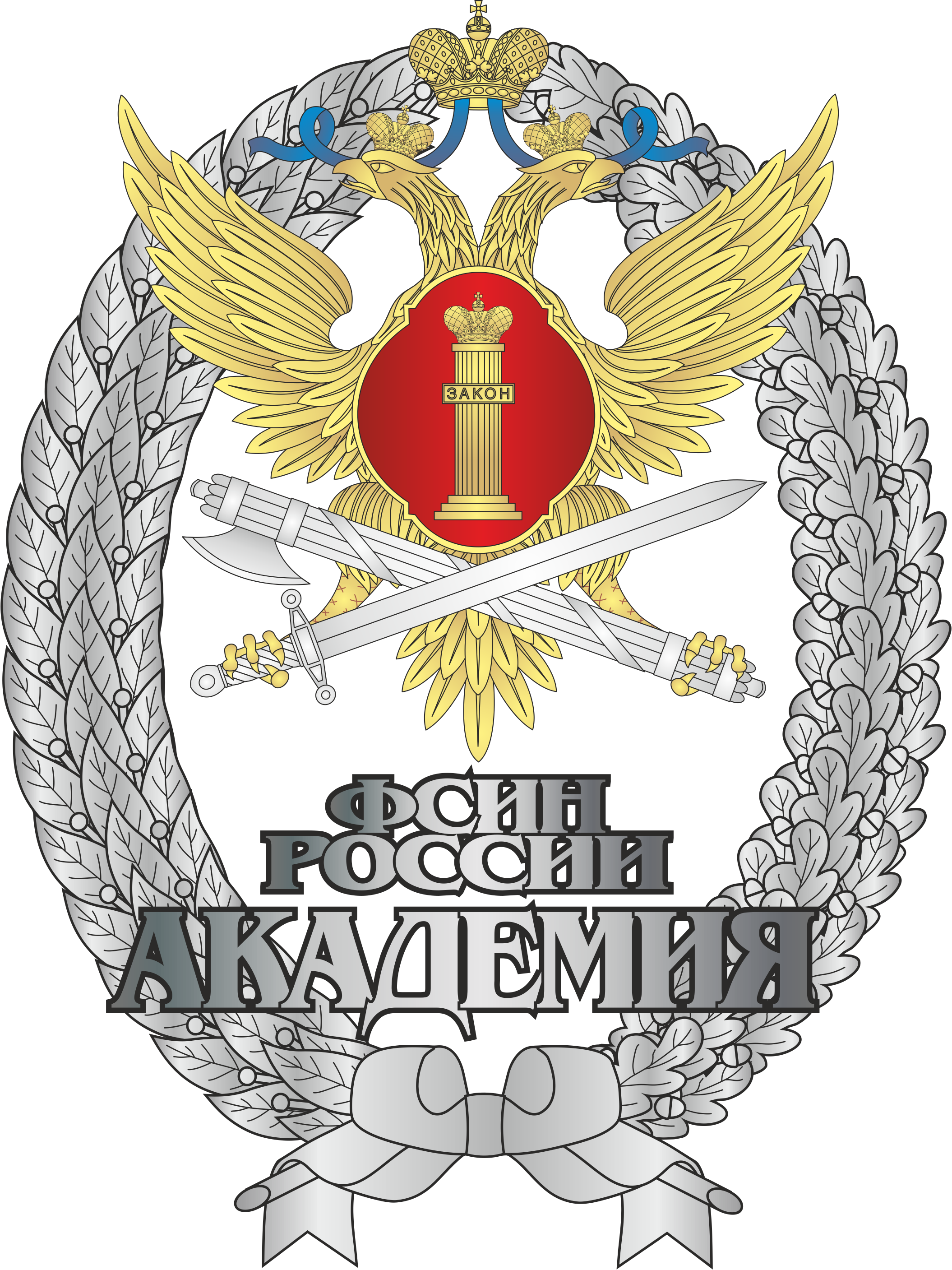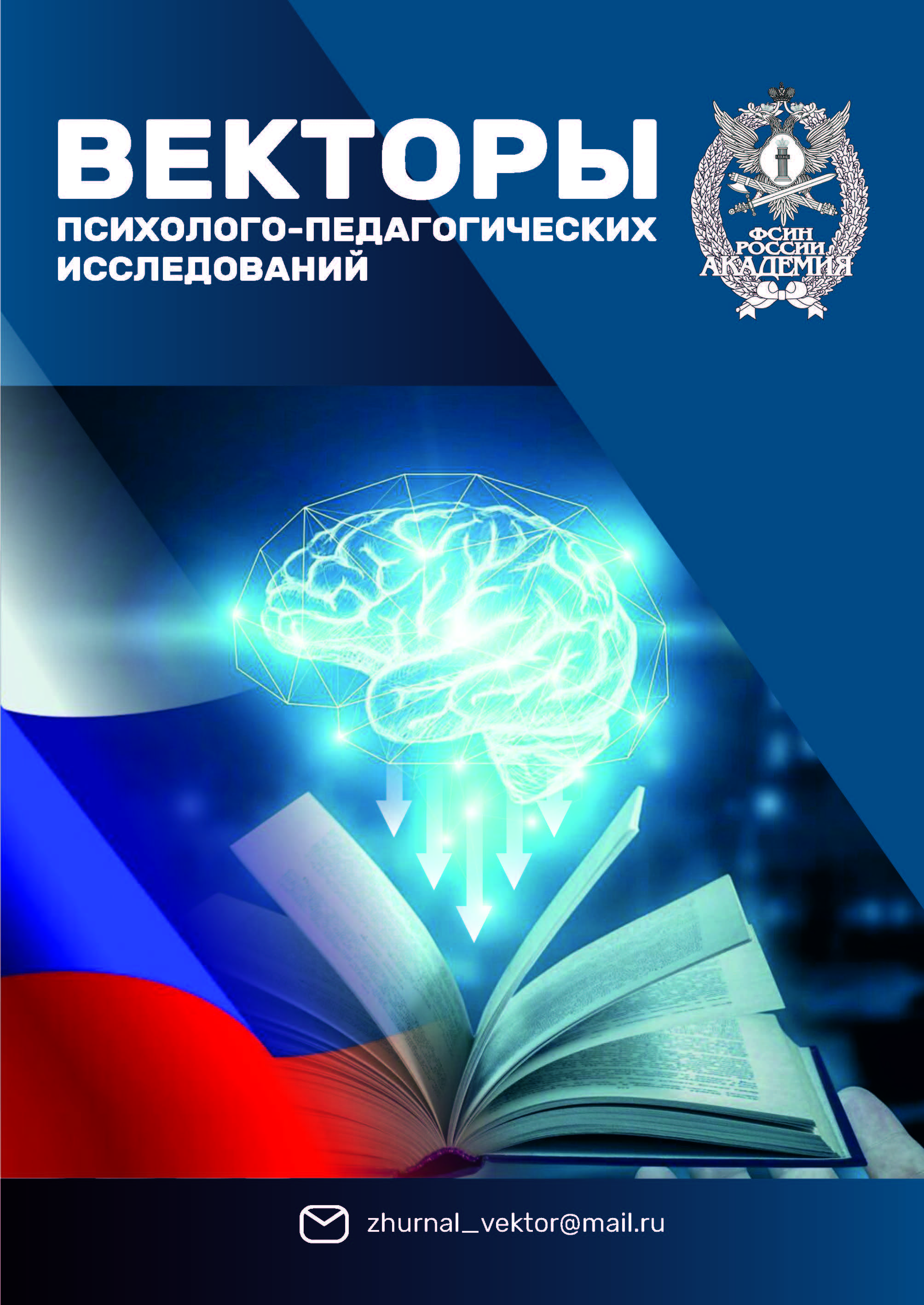UDC 378.6
Currently, the Academy of the FPS of Russia has organized the work of eight scientific schools recognized by the scientific community, based on the continuity of generations of scientists and having founders, an established team of scientific and pedagogical workers of various age groups and scientific qualifications, united by conducting doctrinal or applied research in the general scientific direction, and guided by unified theoretical and methodological approaches. The scientific school "Psychological and pedagogical support of convicts serving criminal sentences" operates in accordance with the legislation of the Russian Federation, the Statute of the Academy of the FPS of Russia, as well as the local regulatory legal acts of the academy. Historically, the scientific school "Psychological and pedagogical support of convicts serving criminal sentences" draws its origins from the works of scientists and psychologists who worked at the academy in the 20th–21st centuries. This article discusses the main results of the activities of employees of the faculty of psychology and probation in 2024 within the framework of the functioning of the scientific school "Psychological and pedagogical support of convicts, serving criminal sentences", whose functions are to conduct scientific research, creation of scientific products distinguished by novelty, theoretical and practical value, providing progressive development of the problem of psychological and pedagogical support of convicts, serving criminal sentences in correctional institutions, training of scientific and pedagogical personnel, taking into account the principle of continuity of generations, development of the scientific potential of the academy.
penal system, scientific school, convicts, psychological and pedagogical support, research work
1. Ganishina, I. S. & Rozhkova, V. A. 2024, ‘The phenomenon of deviant motherhood in places of detention’, Pedagogy and psychology of deviant behavior: monograph, Zebra, pp. 32–44, Ulyanovsk.
2. Zhiltsova, Yu. V., Korysheva, S. E. & Skopina, I. E. 2024, ‘Features of aggressive behavior of male convicts during long periods of imprisonment’, in The phenomenon of aggression in the value system of modern society: monograph, Zebra, pp. 139–151, Ulyanovsk.
3. Kuznetsov, M. I. 2024, ‘Scientific school "Psychological and pedagogical support of convicts serving criminal sentences"’, Man: crime and punishment, vol. 32, iss. 3, pp. 363–370.
4. Ganishina, I. S. & Rozhkova, V. A. 2024, ‘Psychological characteristics of convicted women held in places of deprivation of liberty with young children, and some problems of their psychological support’, Bulletin of the penal enforcement system, iss. 3 (262), pp. 58–64.
5. Ganishina, I. S. & Kovalchuk, D. A. 2024, ‘Personality traits of convicted repeat offenders serving sentences in places of deprivation of liberty’, Applied legal psychology, iss. 3 (68), pp. 45–56.
6. Ganishina, I. S. & Pakhomova, D. A. 2024, ‘Empirical study of volitional self-control of emotional reactions of various groups of convicted male repeat offenders, Vectors of psychological and pedagogical research, iss. 2 (3), pp. 88–97.
7. Ganishina, I. S. & Guseva, A. S. 2024, ‘Comparative psychological analysis of the semantic sphere of the personality of various groups of convicts using the methodology "Test of levels of the semantic sphere of B. S. Bratusya"’, Vectors of psychological and pedagogical research, iss. 3 (4), pp. 27–34.
8. Ganishina, I. S., Maryin, M. I. & Azhimov, V. V. 2024, ‘Interrelation of addictive attitudes, propensity to search for thrills and psychological defenses of personality in drug-addicted convicts’, Psychology and Law, vol. 14, iss. 4, pp. 115–132.
9. Ganishina, I. S. & Rozhkova, V. A. 2024, The average personality profile of convicted women with young children and its use in the process of providing psychological assistance’, Victimology, vol. 11, iss. 1. pp. 176–185.
10. Gornostaev, S. V. 2024, ‘Problems of educational work with convicts held in penal isolation cells and cell-type rooms’, in The penal enforcement system of the Russian Federation: issues of the execution of criminal penalties, the implementation of probation measures, interaction with public authorities and institutions of civil society: collection of abstracts and speeches of the participants of the International scientific and practical conference dedicated to the 90th anniversary of the founding of the Academy of the FPS of Russia, pp. 115–119, Academy of the FPS of Russia, Ryazan.
11. Gornostaev, S. V. & Nizamutdinov, R. R. 2024, ‘Motivation of alcohol-dependent convicts to participate in events aimed at the transition to a sober lifestyle (based on the experience of the FPS of Russia in the Republic of Tatarstan)’, Vedomosti of the penal system, iss. 11 (270), pp. 59–64.
12. Gornostaev, S. V. & Nizamutdinov, R. R. 2024, ‘Experience and psychological problems of treatment and rehabilitation work with alcohol-dependent convicts in the Republic of Tatarstan’, Vectors of psychological and pedagogical research, iss. 1(2), pp. 72–78.
13. Guseva, A. S. 2024, ‘The value-semantic sphere of the personality of those convicted of corruption crimes: a theoretical and empirical analysis’, Victimology, iss. 4, pp. 72–80.
14. Zhiltsova, Yu. V., Korysheva, S. E. & Skopina, I. E. 2024, Pedagogy and psychology of deviant behavior. Personal characteristics of convicts prone to gambling addiction (in the context of the functioning of the scientific school of the Academy of the FPS of Russia "Psychological and pedagogical support of convicts serving criminal sentences"), pp. 125–140, Zebra, Ulyanovsk.
15. Kuznetsov, M. I., Kirillova, T. V. & Hoffman, A. A. 2024, ‘Prospects for improving educational work with convicts in places of deprivation of liberty’, Global scientific potential, iss. 6(159), pp. 80–82.
16. Kuznetsov, M. I. & Kogol, T. N. 2023, ‘Saratov experience in organizing labor education of convicts’, Bulletin of Tomsk Institute of Advanced Training of Employees of the FPS of Russia, iss. 4(18), pp. 135–141.
17. Kuznetsov, M. I. 2024, ‘The current state and ways of improving the material and technical base of educational work with convicts in correctional institutions’, Law and education, iss. 2, pp. 68–75.
18. Rusakov, S. V. 2024, ‘Some features of the emotional and volitional sphere of convicts serving criminal sentences in places of imprisonment for sexual crimes’, Theory and practice of socio-humanitarian sciences, iss. 4(28), pp. 36–46.
19. Romanov, A. A. & Tyugaeva, N. A. 2024, ‘Psychological and pedagogical conditions for the prevention of delinquent behavior of convicts in a correctional institution’, Man: crime and punishment, iss. 4, pp. 67–74.
20. Tkachenko, N. I., Epifanov, S. S. & Sherkhov, R. R. 2024, Prevention and disclosure of escapes of convicts: operational-investigative, legal-psychological and criminological aspects’, Law and the State: theory and practice, iss. 4 (232), pp. 467–471.








